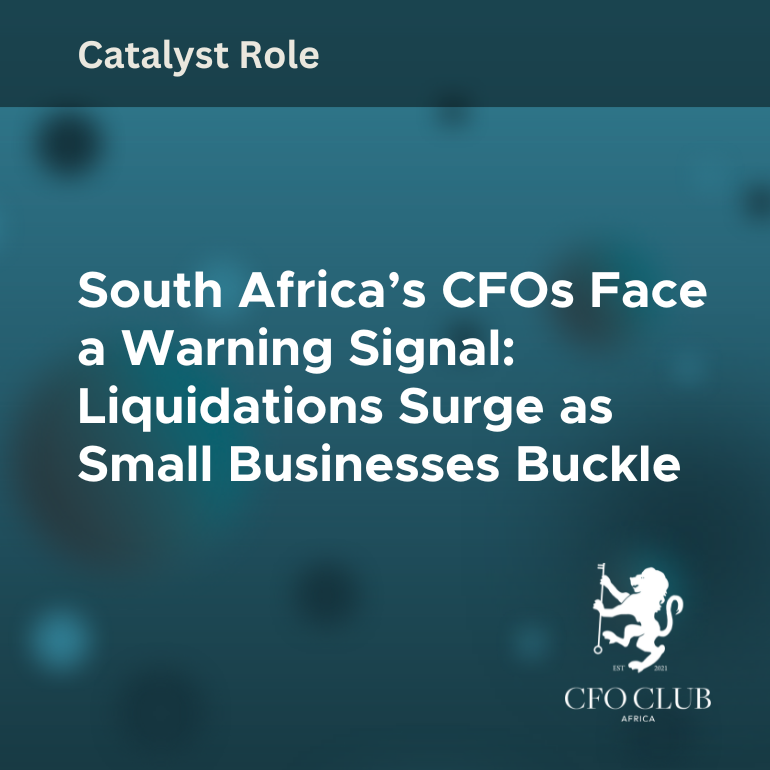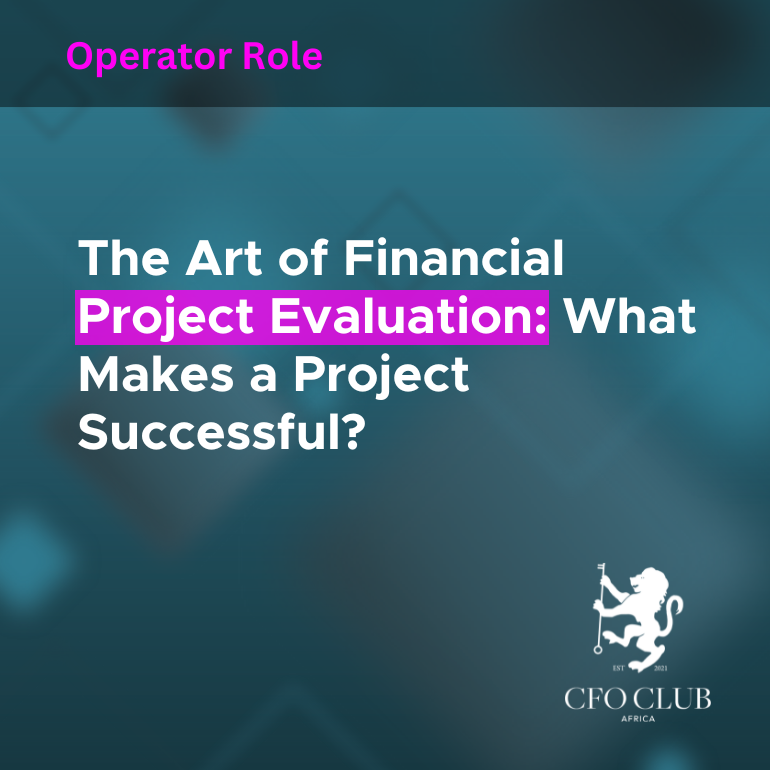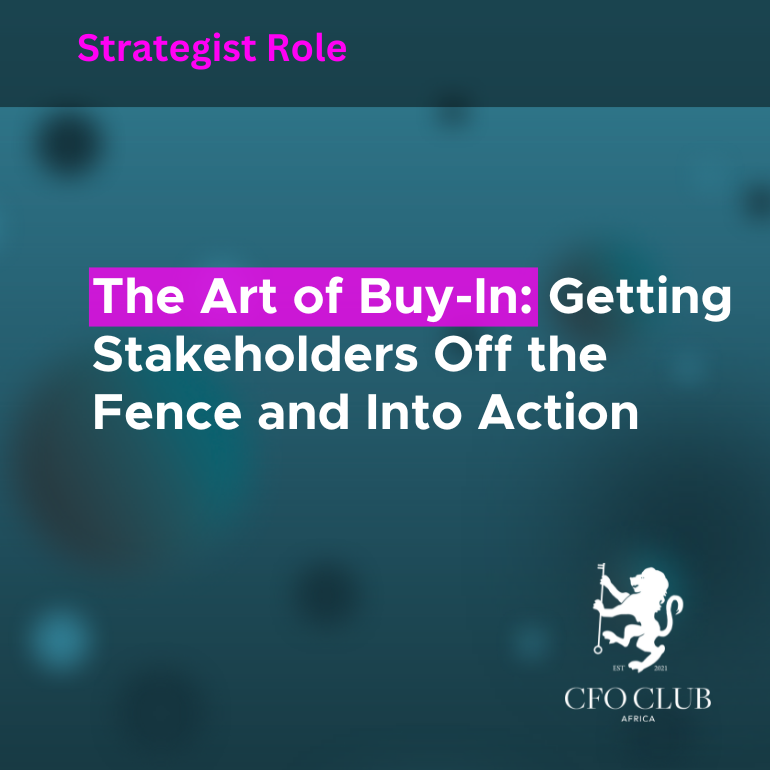When Culture Becomes the CFO’s Greatest Asset: Why culture, purpose, and people drive financial performance
For decades, the CFO’s role was defined narrowly: keep the numbers accurate, manage compliance, secure funding, and protect the balance sheet. It was about discipline, order, and stewardship. Those responsibilities have not disappeared, but they are no longer enough. The modern CFO is not only a guardian of financial integrity but a catalyst for transformation. That means shaping culture, driving purpose, and ensuring that the people inside the organisation are as resilient as the numbers they produce.
This is not about adopting a “soft” leadership style. It is about recognising that people and culture are hard drivers of performance. Finance is not separate from human dynamics. It is the engine that funds them, measures them, and demonstrates their impact. In a South African economy where margins are under pressure, talent is mobile, and trust in institutions is fragile, the CFO who can connect people strategy to financial outcomes holds the most strategic seat at the table.
When People Strategy Becomes Finance Strategy
It is tempting to treat culture and wellbeing as HR’s domain. But look at the companies that fell into crisis, both locally and globally. Many chased aggressive growth targets while neglecting their people. The results were predictable: high turnover, burnout, reputational damage, and even collapse. Steinhoff’s accounting scandal is the most extreme example, but at its core it was a culture problem, a failure to foster transparency, accountability, and honesty in decision-making. The numbers looked good until the human foundation gave way.
Now consider the opposite story. Discovery did not just innovate with its products. Its Vitality programme was a cultural catalyst that reshaped both employees and customers. It made wellbeing and engagement part of the organisation’s DNA. The CFO’s office was critical to this, not only validating the business case but measuring and proving its financial payback. Today, Discovery is one of South Africa’s most admired financial services companies, and the discipline of embedding culture in the business model has been central to that success.
The evidence extends beyond anecdotes. Studies repeatedly show that companies with strong employee engagement outperform those with weak cultures by significant margins. They generate higher shareholder returns, are more resilient during downturns, and recover faster after crises. CFOs who treat culture and purpose as strategic investments, not side costs, are directly influencing the long-term financial trajectory of their businesses.
The Cost of Neglect
For CFOs, the numbers are unavoidable. Absenteeism, staff turnover, and disengagement have a measurable price. Replacing a single skilled professional can cost up to 150% of their annual salary when recruitment, onboarding, and lost productivity are accounted for. Multiply that across dozens or hundreds of employees, and the financial impact of cultural neglect is staggering.
South African companies are also grappling with rising mental health challenges. The South African Depression and Anxiety Group reports that one in four employees suffers from depression. The cost is not only human; it is economic. Lost productivity, sick leave, and reduced performance translate into billions of rand every year. A CFO who supports mental health interventions is not engaging in philanthropy. They are protecting the bottom line.
Municipal failures provide another sobering example. Where governance and culture collapse, services collapse with them. Investors withdraw, businesses close, and communities suffer. In contrast, municipalities that consistently receive clean audits attract infrastructure funding and private partnerships. The lesson is simple: culture and governance are inseparable from financial sustainability.
Reframing the Conversation in the Boardroom
Being a catalyst does not mean abandoning financial rigour. It means reframing how culture, wellbeing, and purpose are discussed in the boardroom. Too often, initiatives in these areas are dismissed as “HR projects” or “corporate social responsibility.” The CFO has the credibility and the language to translate them into financial impact.
When wellbeing initiatives are positioned as risk mitigation strategies, they protect against absenteeism and turnover. When diversity and inclusion are framed as market-access strategies, they open new revenue streams and client bases. When sustainability is linked to investor confidence, it becomes a driver of capital access. These are not soft arguments. They are strategic, and they belong in financial conversations.
The catalytic CFO connects the dots. They quantify the intangible. They show how investments in people and culture not only pay for themselves but compound into long-term advantage. This is how finance leaders move from being number-keepers to value creators.
Building the Catalyst Mindset
So, how can CFOs embrace this catalytic role in practice?
1. Measure What Matters
Extend financial reporting beyond profit and loss to include human capital metrics. Track engagement scores, retention rates, wellbeing measures, and link them to productivity and profitability. When culture is reported alongside financials, the board begins to see it as integral to strategy.
2. Fund with Intent
Do not treat wellbeing, diversity, or purpose initiatives as “nice-to-haves.” Fund them as strategic investments with clear KPIs. For example, if you allocate budget to employee mental health support, measure the reduction in absenteeism and the improvement in output.
3. Champion Transparency
Lead by example. Foster a culture where bad news travels fast and numbers cannot be manipulated. Transparency builds trust, both internally with employees and externally with investors.
4. Reframe Discomfort
Cultural transformation is rarely smooth. Resistance, discomfort, and tension are inevitable. A catalytic CFO positions this not as failure, but as evidence of growth. Discomfort signals adaptation, and adaptation builds resilience.
The Catalyst’s Bottom Line
- Culture and purpose are not HR’s side projects. They are financial drivers that determine long-term resilience.
- CFOs who invest in human capital wisely see measurable returns in retention, productivity, and investor trust.
- The most powerful financial arguments for wellbeing and culture come from the finance function, not from HR.
- The catalytic CFO is not only the guardian of numbers. They are the spark that turns strategy into a movement people believe in.
In a South African economy under pressure, numbers alone will not sustain growth. Resilience will come from people who feel supported, motivated, and proud to contribute. That is the real catalytic power of the CFO. By connecting culture to capital, and purpose to performance, you do more than balance the books. You build the future.





